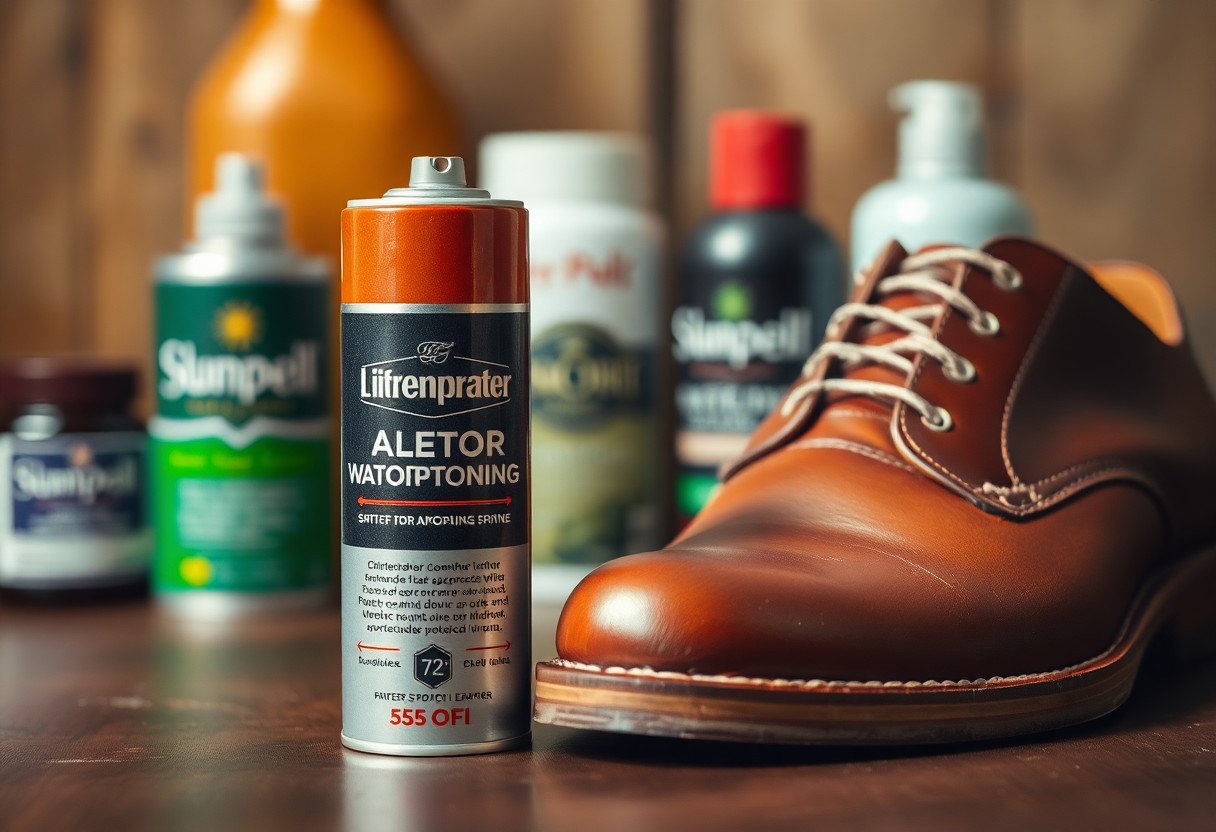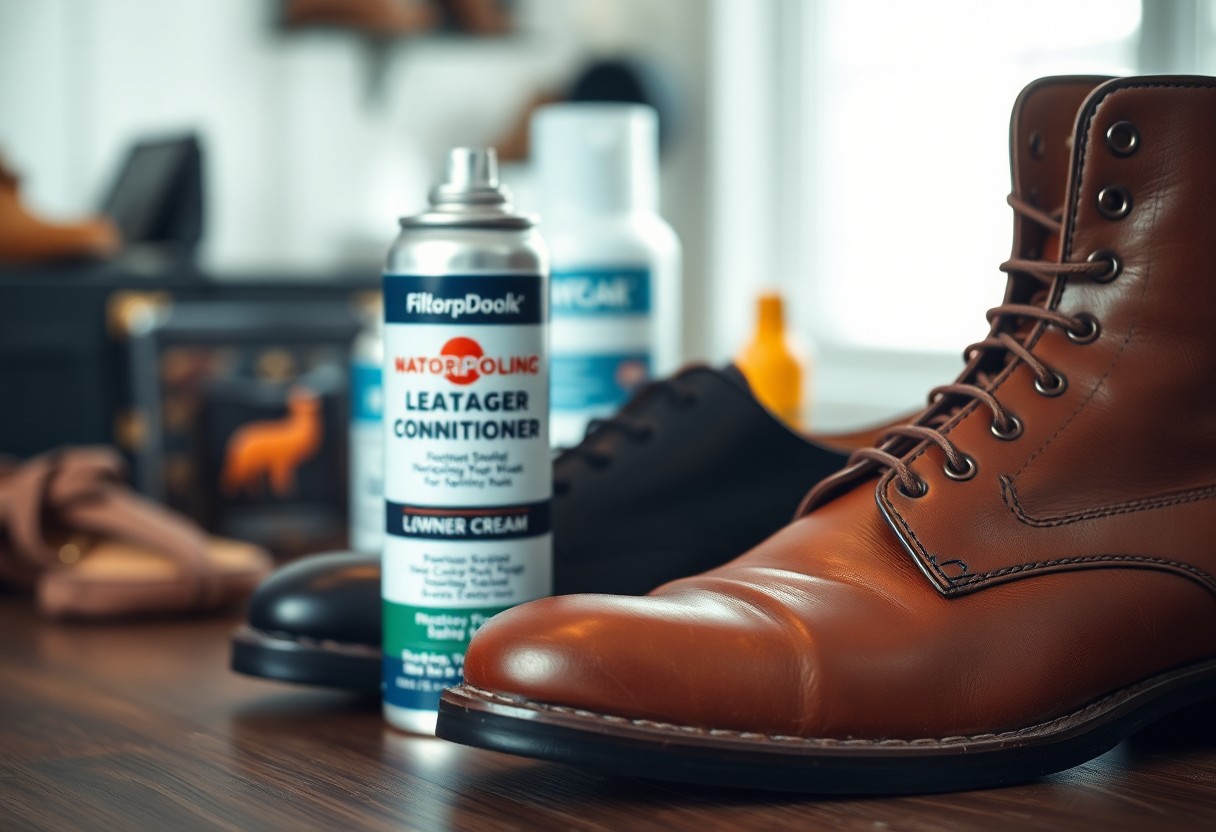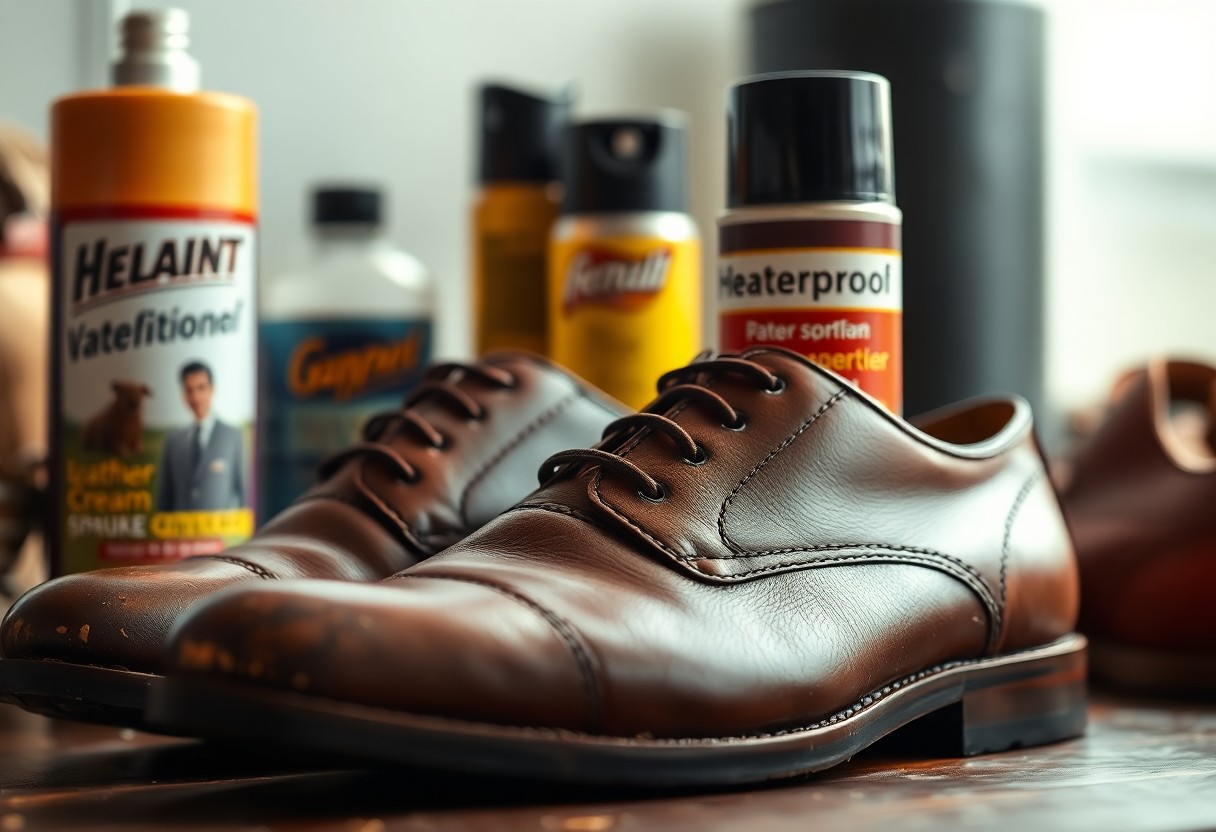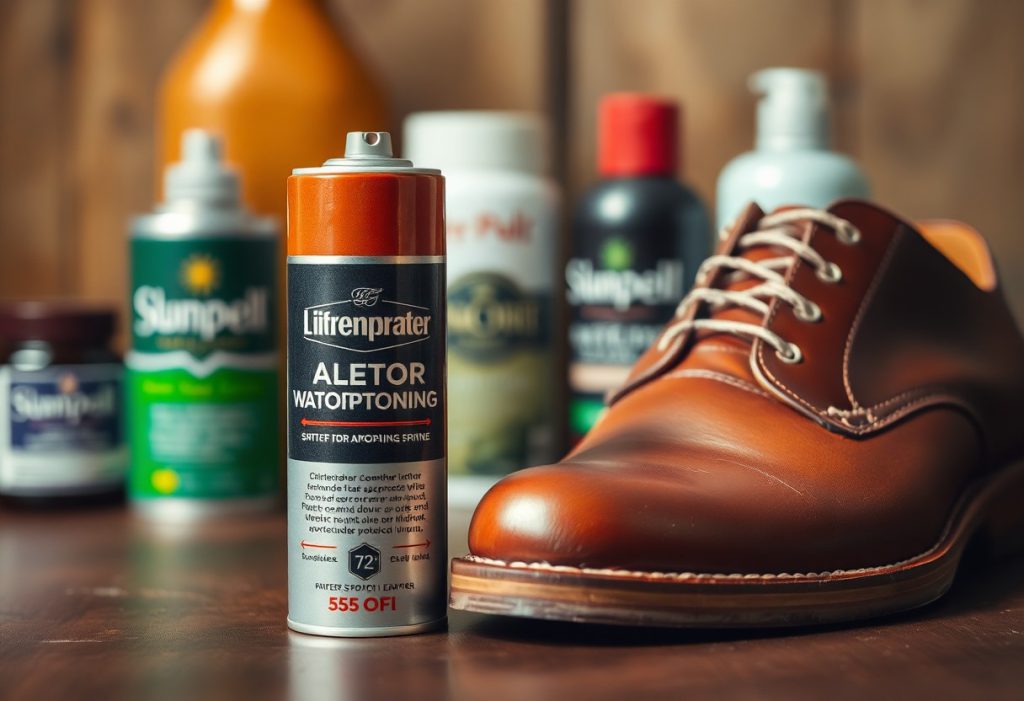Avoiding Common Leather Care Mistakes is crucial to prevent serious and irreversible damage to your cherished shoes. One prevalent error is using waterproofing sprays on smooth leather. Although these sprays might appear to be a convenient solution for protecting your footwear, they can block essential nutrients from being absorbed by the leather, leading to dryness and cracks over time. Smooth leather naturally exhibits some water resistance due to its grain structure, but it requires proper nourishment through shoe creams and waxes to sustain its longevity. Instead of relying on potentially harmful sprays, opt for high-quality leather conditioners and wax polishes that not only protect but also provide nourishment, ensuring durability while enhancing the leather’s natural beauty.
Enhancing Leather Durability Through Expert Protection Techniques
To ensure the longevity of your leather goods, it’s essential to grasp the protective qualities inherent in leather. Full grain leather boasts natural water-resistant characteristics, thanks to its tightly woven fiber structure. However, to maintain these intrinsic properties, careful maintenance is necessary. The lifespan of your leather is significantly influenced by the quality of care it receives. Using waterproofing sprays can compromise the leather’s breathability, potentially leading to severe damage if not addressed appropriately. Therefore, mastering the right leather care methods is critical for optimal preservation.
Understanding the Unique Benefits of Full Grain Leather
After the tanning process, full grain leather retains its original surface layer, offering exceptional natural protection. Items made from this type of leather feature a complete grain layer, providing resistance against water and wear. This top layer is infused with natural oils and fibers that create a robust protective barrier, making additional waterproofing sprays unnecessary and potentially detrimental to the leather’s health. By understanding these benefits, you can make informed decisions on the best care methods for your leather products, ensuring they remain in optimal condition.
Recognizing Leather’s Natural Moisture Management and Aging Process
Full grain leather must maintain its ability to effectively absorb and release moisture. The leather’s pores allow it to breathe and manage moisture levels, keeping it supple and preventing unsightly cracks. However, waterproofing sprays can seal these pores, restricting vital airflow and disrupting the natural moisture equilibrium. Additionally, as leather ages, it requires appropriate nourishment through conditioning products. When waterproofing sprays are applied, they create a barrier that prevents essential conditioning oils from penetrating the leather, leading to dryness and brittleness over time. Regularly applying leather cream is vital for enabling your leather to age gracefully and develop a rich, appealing patina, enriching its overall appearance.

Recognizing the Dangers of Relying on Waterproofing Sprays
Many people mistakenly believe that waterproofing spray is the ultimate safeguard for their leather shoes, but this common practice can result in serious harm to your footwear. While these sprays provide an immediate barrier against water, they simultaneously hinder essential nutrients from reaching the leather, setting the stage for potential long-term deterioration. Understanding the ramifications of this practice is vital for maintaining the health and longevity of your footwear.
Debunking Misleading Myths Surrounding Leather Care Marketing
Thanks to aggressive marketing campaigns and well-intentioned advice from shoe store personnel, you may have been misled into thinking that waterproofing spray is essential for all leather shoes. This misconception is perpetuated by numerous shoe retailers, largely due to the high profit margins and frequent repurchase rates associated with these products. The reality is that regular smooth leather comes equipped with natural protective characteristics that do not require additional spray-on barriers for effective safeguarding.
Evaluating Short-term Benefits Versus Long-term Consequences
The damage to your leather shoes starts when waterproofing sprays create a barrier that prevents essential oils and conditioning agents from penetrating the leather. Although you may initially observe improved water resistance, the leather gradually becomes dry and brittle without the vital nourishment it needs. The implications of using waterproofing sprays on smooth leather extend far beyond mere surface protection. Your leather requires regular nourishment to maintain its flexibility and durability. If shoe creams and conditioners are unable to penetrate the leather due to the spray barrier, the material risks cracking and deterioration, significantly shortening your shoes’ lifespan. Emphasizing natural waxes and proper conditioning methods will provide superior long-term protection while promoting the overall health of the leather.

Exploring the Science Behind Effective Leather Care
A critical aspect of successful leather care is understanding its molecular composition. The collagen fiber networks within your leather shoes require both protection and nourishment. When applying products to leather, they can either form a coating on the fibers or penetrate deeply into them. This interaction is crucial for the long-term preservation of your leather shoes. Gaining insight into this process enhances your ability to choose the right products that will nurture and safeguard your footwear.
Emphasizing the Importance of Nourishing Your Leather
It is essential to recognize that your leather shoes require regular nourishment to maintain their quality. The natural oils present in your leather shoes help prevent cracking and enhance flexibility. Over time, these oils diminish due to wear and exposure to various environmental factors. To uphold the structural integrity of the leather, it’s crucial to replenish these oils through dedicated conditioning practices. Consistent maintenance will significantly prolong the lifespan of your shoes and keep them looking their best.
Grasping the Barrier Effects of Waterproofing Sprays on Leather
A major concern with waterproofing sprays is their tendency to create an obstructive barrier. When these sprays are applied to smooth leather, they form an impermeable layer that blocks both water and essential nutrients. This barrier inhibits your leather care products from effectively penetrating the surface, which can lead to a gradual decline in the leather’s overall quality. Understanding this barrier effect is vital for maintaining the leather effectively.
The barrier created by waterproofing sprays can set off a troublesome cycle for your shoes. While these sprays successfully repel water, they simultaneously restrict the absorption of conditioning products that are crucial for the leather’s health. As a result, the leather may appear protected on the surface but is actually dehydrating and becoming brittle underneath. Silicone-based sprays are particularly detrimental, as they create a permanent barrier that is difficult to remove without damaging the leather.
Implementing Proven Techniques for Leather Protection
Contrary to popular belief, your smooth leather shoes require targeted care strategies that align with the natural properties of full-grain leather. The optimal approach combines traditional methods with products that enhance the leather’s innate protective qualities, ensuring both immediate protection and lasting durability for your footwear. Familiarizing yourself with these techniques will empower you to better care for your leather items, ensuring they remain in excellent condition.
Exploring the Benefits of High-Quality Wax-based Products
An outstanding alternative to waterproofing sprays can be found in premium wax-based products. These solutions work synergistically with your leather’s natural grain rather than against it. Applying wax polish creates a protective barrier that still allows the leather to breathe, making it especially beneficial for toe caps and high-wear areas. This method safeguards the leather’s health while offering sufficient moisture protection, ensuring your shoes remain stylish and functional.
Maximizing the Benefits of Regular Cream and Conditioner Use
In contrast to conventional spray treatments, leather creams and conditioners provide essential nourishment while preserving the leather’s inherent protective properties. Your shoes benefit from oils that deeply penetrate the material, helping to prevent drying and cracking. Furthermore, consistent application of cream and conditioner creates a cumulative effect that enhances leather quality over time. The natural oils contained in these products support the leather’s flexibility and strength, allowing it to develop a beautiful patina. It is advisable to apply these products every 4-6 wears to maintain the best condition of your leather.

Determining the Appropriate Use of Waterproofing Spray
Unlike smooth leather, certain materials stand to gain significantly from waterproofing sprays. These products establish an effective water-resistant barrier on specific materials that lack inherent protection. Waterproofing sprays are especially beneficial for suede, nubuck, and various textiles, where the material structure does not offer natural moisture resistance.
Boosting the Resilience of Suede and Nubuck with Waterproofing Spray
When you apply waterproofing spray to your suede or nubuck shoes, you greatly enhance their resistance to moisture-related damage. While many modern suede materials come pre-treated with factory waterproofing, additional protection can help maintain this defense over time. The application of spray forms a protective barrier that effectively prevents water from penetrating these delicate materials, ensuring their longevity and overall appearance.
Providing Robust Protection for Textile Footwear
In addition to leather alternatives, textile footwear requires specific protection against water damage. Materials such as canvas, mesh, and synthetic fabrics benefit from improved water resistance through appropriate spray application. Most textile materials are naturally absorbent, making them prone to water damage and staining. This susceptibility necessitates the implementation of suitable protective measures to maintain their appearance and functionality.
Moreover, waterproofing sprays for textiles help to preserve the shape and color of your shoes. The barrier they create also prevents dirt and debris from becoming embedded in the fabric fibers, enhancing the overall durability of your footwear. It is advisable to reapply the spray every 3-4 months for optimal protection, based on how frequently the shoes are worn and the prevailing weather conditions.
Gaining Insights from Industry Experts on Effective Leather Care Practices
Not all leather treatments are created equal. Experts in leather care consistently advise against the use of waterproofing sprays on smooth leather. Your full-grain leather shoes require specialized care that allows them to breathe and absorb nourishing treatments effectively. Using inappropriate products can lead to leather damage that costs hundreds of dollars, underscoring the importance of selecting the appropriate care methods.
Expert Perspectives from Tannery Specialists
To maintain the quality of leather, tannery specialists emphasize that full-grain leather possesses inherent water-resistant properties in its outer layer. Safeguarding the leather’s protective qualities requires the application of oils and waxes. Waterproofing sprays can hinder these essential treatments from penetrating the leather, ultimately compromising its integrity and lifespan.
Advice from Professional Cobblers on Leather Maintenance
For the long-term care of leather, professional cobblers advocate for the use of wax-based products instead of waterproofing sprays. Your shoes will flourish with treatments that both protect and nourish the leather. Studies indicate that 90% of premature leather damage results from the use of incorrect care products, highlighting the necessity for established maintenance strategies.
By adhering to effective leather care techniques, your shoes can last an impressive 15-20 years instead of just 2-3 years with poor maintenance. Traditional wax treatments allow leather to retain its natural properties while providing adequate moisture protection. Your investment in quality leather footwear deserves meticulous care practices that preserve both aesthetic appeal and durability throughout the years.
Key Takeaways for Optimal Leather Care and Maintenance
Your smooth leather shoes require appropriate care strategies that eliminate the use of waterproofing sprays. Instead, select shoe creams and waxes that nourish the leather while delivering effective water protection. Full-grain leather inherently possesses protective qualities due to its grain layer, whereas waterproofing sprays can obstruct essential oils from penetrating the leather, leading to dryness and cracks. Reserve waterproofing sprays for suede, nubuck, or textile footwear, where they can perform effectively. By choosing the right products, you can safeguard your leather shoes and ensure their longevity for many years to come.
Addressing Common Questions About Leather Care Techniques
Q: Why is waterproofing spray harmful to smooth leather shoes?
A: Waterproofing spray creates a barrier on leather that prevents essential oils and conditioners from penetrating the material. While it does provide water protection, it obstructs the necessary nourishment of the leather, leading to drying and potential cracking over time, ultimately reducing the lifespan of the shoes.
Q: What alternatives should I consider instead of waterproofing spray on smooth leather shoes?
A: Consider using a combination of shoe cream and wax polish as effective alternatives. Shoe cream provides essential oils to nourish the leather, while wax polish creates a protective layer that helps repel water. This method enhances the natural protective properties of full-grain leather, ensuring the leather’s health while providing effective water resistance.
Q: Which types of footwear can I apply waterproofing spray to safely?
A: Waterproofing spray is suitable for materials like suede, nubuck, and textiles. These materials lack the natural protection found in smooth leather and thus benefit from the protective barrier created by waterproofing sprays. Many modern suedes and nubucks may already have factory waterproofing treatments, but additional spray applications can enhance and maintain this level of protection.
The Article Why you shouldn’t use waterproofing spray on regular smooth leather and better alternatives appeared first on My Shoes Finder
The Article Waterproofing Spray on Smooth Leather: Risks and Alternatives Was Found On https://limitsofstrategy.com
References:
Waterproofing Spray on Smooth Leather: Risks and Alternatives
Waterproofing Spray Risks for Smooth Leather and Alternatives



This is such an important topic, especially for anyone who loves quality leather goods. I’ve definitely made the mistake of using those convenient waterproofing sprays in the past, thinking I was doing the best for my shoes. It wasn’t until I started noticing some dryness and cracking that I realized the potential harm they could cause. I appreciate the reminder here about using leather conditioners and wax polishes instead; they do a much better job of maintaining the leather’s beauty and integrity.
You’ve hit the nail on the head with the whole waterproofing spray fiasco. It’s like giving your beloved leather a mysterious potion and hoping for the best. One moment, your shoes are looking sharp, and the next, they’re dry and cracking, almost like they’re trying to pull off that “aged” look a bit too soon.
It’s definitely easy to assume that a quick spray can do the trick, isn’t it? I’ve been there too—pulled in by the idea of convenience without really considering the long-term effects. Leather, in particular, is such a unique material. The way it ages and develops character is part of its charm, but that can be overlooked when we rely on synthetic solutions.